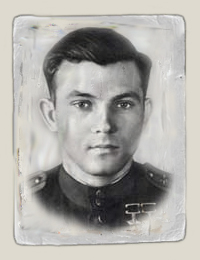Grigory Mylnikov
 25. 5. 1919 - 26. 9. 1979 25. 5. 1919 - 26. 9. 1979Grigory Mylnikov was squadron commander of the 15th Guards Ground Attack Aviation Regiment (the 277th Assault Air Division, the Leningrad Front). He was born on May 25, 1919 in Egorievka, Kastorensky district of the Kursk region in a peasant family. Russian. He graduated from the Trade Factory Apprenticeship. Joined the Army in 1939. In 1940 he graduated from Borisoglebovsk Air Force Pilot School. Took part in the Great Patriotic War from July 1941. Fought in the 174th (from March 1942 – the 15th Guards) Attack Aviation Regiment on the West, Leningrad and the 3rd Belorussian Fronts. Showed great skill in performing especially difficult tasks on the bomber. Found in the impenetrable blizzard and destroyed the Nazi long-range battery that fired the streets of Leningrad. Later discovered and bombed unnoticed well camouflaged railway train carrying military equipment. One of the first to sink the Nazi transport in the sea. By September 1944 as squadron commander of the 15th Guards Ground Attack Aviation Regiment (the Leningrad Front) made 193 sorties, inflicted great damage to the enemy. By the Decree of the Presidium of the Supreme Soviet on February 23, 1945 for his courage and heroism in battle, squadron commander of the 15th Guards Attack Aviation Regiment, Captain Grigory Mylnikov was awarded the honorary title of Hero of the Soviet Union, the Order of Lenin and the Gold Star medal (# 5992). Later his regiment fought as part of the 1st Air Army of the 3rd Belorussian Front. In January 1945, at the approaches to Koenigsberg six IL-2 planes headed by Mylnikov, inflicted devastating blows against tanks and enemy firing points, which were in dangerous proximity to our infantry. By February 1945, he brought the score to 223 sorties. By the Decree of the Presidium of the Supreme Soviet on April 19, 1945 squadron commander of the 15th Guards Attack Aviation Regiment, Major Grigory Mylnikov was awarded a second Gold Star medal (# 37). A few days before the war finished, he was severely wounded. Since 1945 - in reserve. In 1954 he graduated from the Institute of National Economy named after G. Plekhanov, and worked as an economist. He lived in Moscow. Died on September 26, 1979. He was buried at Vagankovskoye cemetery in Moscow. Lieutenant Colonel (1979). He was awarded the Order of Lenin (1945), three Orders of the Red Banner (1942, 1944, and 1945); the Order of Alexander Nevsky (1943), the 1st Class Order of the Patriotic War (1944), the Order of the Red Star (1941), and medals. A bronze bust of Hero was set in his native village. |




